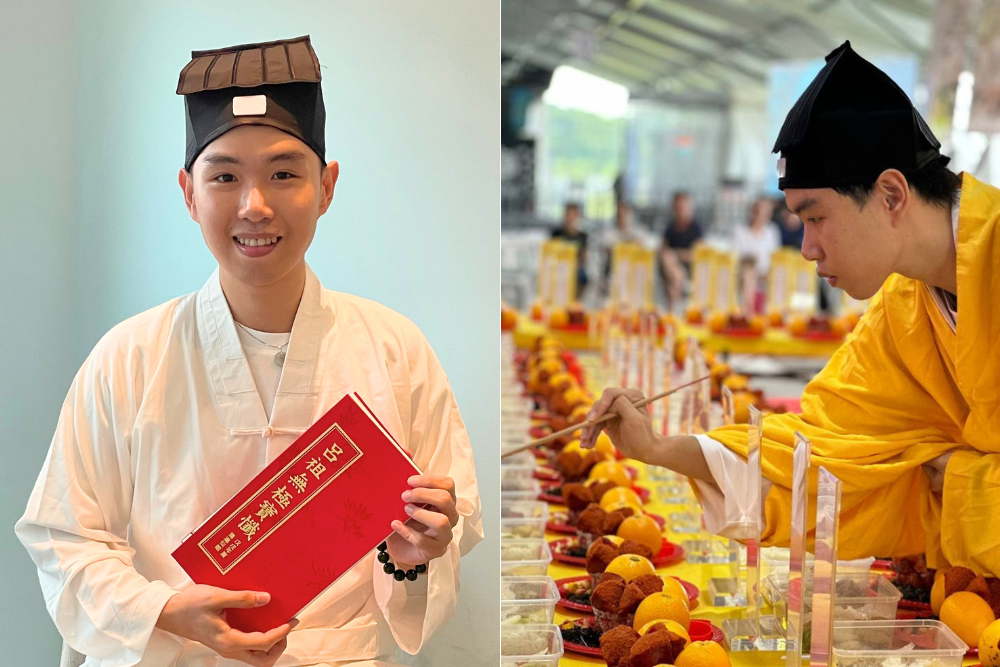We’re not starting a cult but some followers on Instagram would be nice. Thank you.
A Chinese government official’s tweet showcasing a 26-storey pig farm has prompted outrage.
On Feb. 18, 2023, Zhang Meifang, the Consul-General of China in Belfast, Northern Ireland, tweeted what appears to be drone footage of an ordinary office building.
In her tweet, she explains that the building is in fact an RMB4 billion (S$778.44 million) facility capable of housing more than 600,000 pigs.
Profitable high tech farm:
$4 billion RMB to build a 26 story building to raise 600,000+ pigs 🐷! #technology #FridayVibes #China pic.twitter.com/2JFjIAZpLW— Zhang Meifang张美芳 (@CGMeifangZhang) February 17, 2023
“Are you really proud of this?”
Not everyone was as excited as she was about the new facility though.
Journalists Alex Milone and Matthew Gwyther questioned if this development was really something to be proud of.
Are you really proud of this? Think about it
— Alex Milone (@AlexMilone) February 19, 2023
and you think that’s something to be proud of?
— Matthew Gwyther (@MatthewGwyther) February 18, 2023
There were also accusations of animal cruelty:
I’m a meat eater but this is just wrong and animal cruelty.
— Rovdjuret (@JulietEchopapaa) February 19, 2023
While some pointed out the possible biohazard concerns:
There is no way the methane and waste emission is managed well under such close quarters. It’s a bio reactor for virus and bacteria.
— Chin Hin Low (@chinhinl) February 18, 2023
High-rise pig farms are not new
Dystopian as this may seem, high-rise pig farming is not a new development.
In 2020, The Guardian reported on the construction of a 12-storey pig farm on the Yaji mountain in southern China with the ability to produce around 840,000 pigs a year.
It was to be the tallest pig farm in the world.

Image via Diego San/Unsplash
Chinese farmers have been plagued by several consecutive pandemics—Covid-19, the H1N1 swine flu, African swine fever (ASF), and foot-and-mouth disease.
Dirk Pfeiffer, a professor of veterinary medicine at City University in Hong Kong, proffered:
“The enormous density of pigs and chickens, most produced by small-to-medium-sized farms with poor biosecurity, interconnected with each other via transport networks to huge numbers of slaughterhouses and wet markets, also with poor hygiene, generates infectious disease risks.”
Can you believe, a high-rise pig farm? On Yaji Mountain in southern China, 1,000 sows per floor crowd into high-rise “hog hotels,” It’s a 13-floor breeding operation will be world’s tallest building of its kind. Hard to imagine what producing food will be like in years to come. pic.twitter.com/Aux00klSvr
— Jim Brown (@jimbrownla) May 26, 2018
Going vertically, it was suggested, might help ameliorate some of the issues associated with the traditional supply chain.
The Yaji farm uses quarantine buildings for workers and a strict disinfection process every time they enter.
Workers are not allowed to leave the facility except on their day off.
The pigs also stay on one floor for their entire lives and each unit has a ventilation system, as well as a specific pipeline to transport dead piglets for incineration.
Going higher
The 12-storey Yaji facility is now dwarfed by this new 26-storey farm, located in Ezhou, a city in eastern Hubei Province, China.
As the tip of the iceberg in #China’s animal husbandry development, a modern 26-story all-in-one farm has been built in Ezhou prefecture of #Hubei province with the capacity to bring 600,000 pigs to market annually. pic.twitter.com/rajL10WVbl
— Juan Yong (@JuanYong_JY) November 5, 2022
According to The New York Times, there are plans for a second identical tower to be built, bringing the total production capacity to 1.2 million pigs a year.
Like the Yaji farm, the Ezhou farm also employs strict disinfection protocols on entry.
The pigs are monitored with high-definition cameras and tracked by technicians who control their food and water intake, as well as environmental factors like temperature and ventilation.
Part of the pig faeces are also repurposed as methane to generate electricity.
While these farms are highly efficient and productive, there are also concerns that they may be pricing out traditional backyard farmers.
Qiao Yuping, who raises about 20 to 30 pigs a year with her husband, told The New York Times that megafarms like these drive up feed and vaccine prices, leaving small farmers like herself to contend with higher costs.
Biohazard risks
Despite the protocols in place, there are still concerns that housing animals in such close quarters could be a breeding ground for diseases.
In the New York Times article, Brett Stuart, founder of Global AgriTrends, a market research firm, said that raising so many pigs together in a single facility makes it harder to prevent contamination.
Pig farmers in the U.S., he said, spread their farms out to reduce this risk.
“U.S. hog farmers look at the pictures of those farms in China, and they just scratch their heads and say, ‘We would never dare do that. It’s just too risky.’”
Matthew Hayek, an assistant professor in environmental studies at New York University said to The Guardian, “Intensive facilities can reduce interactions between domesticated and wild animals and their diseases, but if a disease does get inside they can break out between animals like wildfire.”
The significance of pork to China
The Chinese love pork so much, says the South China Morning Post, that “even the Chinese word for meat automatically implies pork”.
The domestication of pigs for food in ancient China can be traced back to 6000 BC, and today, the country consumes half the world’s pork.

Image via Getty Images
The meat is so important, that the Chinese government stockpiles pork in a strategic pork reserve.
In October 2022, the government released 20,000 tonnes of meat from the reserve in an attempt to stabilise rising pork prices.
Pork prices are also watched as an indication of inflation, a phenomenon that Nikkei Asia calls “porkflation”.
Is this worse than current farming methods?
The idea of a large-scale facility where pigs live out their entire lives in a confined space sounds just like a dystopian nightmare.
But is this really any worse than current methods of farming?
Investigations have exposed incidents of animal cruelty at several pig farms, including some backed by U.K. animal welfare charity, the Royal Society for the Prevention of Cruelty to Animals.
Reddit user Dontworryaboutit1 pointed out that conditions are similar to U.S. farms, just that farms in the U.S. aren’t multi-storied.
User Strong-Protection-35 posted an image of one of the levels in a multi-storey pig farm (not the 26-storey one in question) to Reddit community oddlyterrifying, prompting several comments saying that the farm looked cleaner than U.S. farms.
What is factory farming?
Approximately 90% of the world’s meat supply comes from factory farms just like these.
Factory farming is a form of intensive agriculture meant to maximise output with the least possible resources.

Image via Phil Hearing/Unsplash
Animals are crammed together, often in unsanitary conditions, which increases the risk of diseases spreading and turning into a full-blown pandemic.
People for the Ethical Treatment of Animals (PETA) has detailed some of the horrifying conditions and cruelty that farm animal are subjected to, such as as starvation and dehydration.
If not factory farmed-meat, then what?
A study conducted by food psychologists from the University of California, Los Angeles, found that most meat eaters were unwilling to switch to vegetarian diets due to taste and health concerns.
While ethically-sourced meat options are available, the cost can sometimes be prohibitive.
In recent years, more plant-based options mimicking meat have hit the market, though with limited success.
And even more recently, lab-grown meat cultivated from cells has become the latest alternative protein, with Singapore becoming the first in the world to allow the commercial sale of cultivated meat in 2020.
Eat Just, which brought cultivated meat to Singapore, is also building a plant there which is slated to open in the first quarter of 2023.
According to CEO Josh Tetrick, the company aims to have the cost of its products to be similar or lower than chicken, beef and pork by the end of 2030.
Whether it will successfully insert itself into the modern diet, however, remains to be seen.
Top image via 诗和远方/小红书, Getty Images and Dontworryaboutit1/Reddit.
If you like what you read, follow us on Instagram, TikTok, Twitter and Facebook to get the latest updates.
More Stories:

How this 24-year-old NUS student & priest is using TikTok to make Taoism more accessible to Gen Zs
Don't tell him to calm down.

She became a couch potato after dropping out of school at 18, but now walks for London & Paris fashion weeks
Who else who could pull off microbangs like that??

‘I just want to do this first before I regret it’: S’pore teacher quits her job to become an OnlyFans creator
Her mother's death was the 'turning point' in making this decision.

‘We’re not going to give up so easily’: 21-year-old drops out of uni & uses TikTok to save his family’s restaurant
And it's working.

Unable to find jobs, Gen Zs in China are returning home to be ‘full-time children’
Not as cushy as it sounds.

Chinese journalist draws flak on Twitter for happy portrayal of Kashgar, Xinjiang in travelogue
Twitter is officially blocked in China.

A TikToker’s pet cat was allegedly confined for 38 hours without food & water by China Airlines
She plans to take legal action with an international lawyer.


